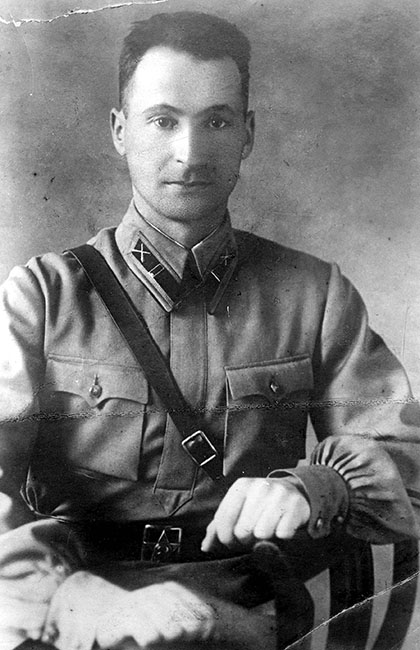Boris Khigrin was born in 1909 in Orsha, Belorussia. His father was a bookkeeper for one of the local mills. After the family moved to Moscow in 1924, Boris studied at evening school and simultaneously worked at a factory. In 1931 he entered the Moscow Artillery School. After graduating, he was named commander of a platoon of a border unit. On June 23, 1941, the day after Hitler's Germany invaded the Soviet Union, the division of Captain Khigrin was already engaged in combat.
Retreating under the pressure of the Wehrmacht, after fierce battles on June 27, units of the Red Army abandoned Minsk and, in early July, took up a defensive position on the Drut River. The artillerymen of Khigrin's division had the assignment of preventing the German tanks from reaching a bridge across the river. On July 5, before they had been able to assume their combat position, the German tanks attacked, supported from the air by Messerschmitt aircraft. Khigrin ordered his troops' weapons to be prepared to fire over open sights. With their first shots the artillerymen destroyed two enemy tanks. The commander of one Soviet battery and the aimer of another were killed by the Germans. Khigrin himself replace the dead aimer and continued firing. During this combat Khigrin destroyed 4 enemy tanks but then he was killed. The posthumous award certificate said: "In this battle with heavy artillery fire the enemy knocked out several weapons. Under heavy enemy fire Captain Khigrin collected the remaining weapons and, personally directing the weapon fire, beat back the tank attack, destroying 4 enemy tanks."
Boris Khigrin was buried in the town of Belynichi in Belorussia.
On February 27, 1943 the newspaper of the Jewish Anti-fascist Committee Eynikayt published an article by Shmuel Persov titled "Captain Khigrin," which told about the hero's childhood in Orsha and his final battle near Minsk.







